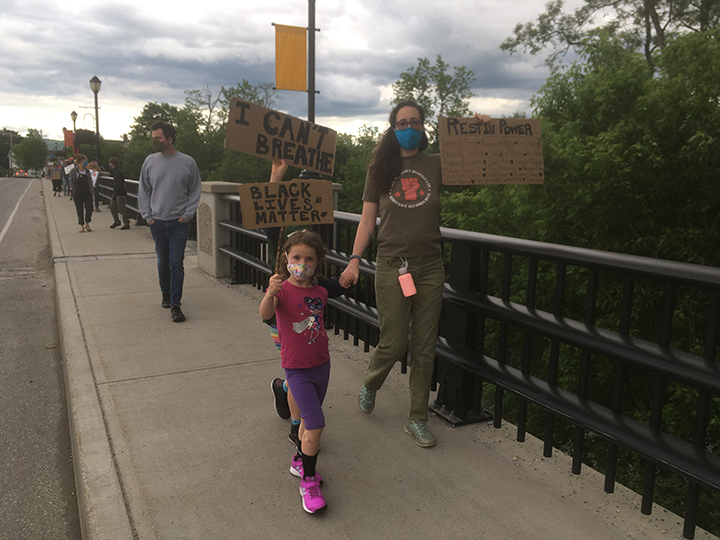

When Trayvon Martin was killed in Florida in 2012, Joanna Colwell’s daughter was 11 years old. Just old enough, Colwell recalled, to walk by herself to the store in East Middlebury for a Snapple.
“It was not in my consciousness that she could be the victim of violence,” Colwell said. “And that is what it is for Black parents.”
Seventeen-year-old Trayvon had been walking back from a convenience store when he was shot and killed by George Zimmerman.
“I was very in my bubble,” Colwell acknowledged. “But, as a mom, that murder just got to me and activated me.”
Since then, Colwell, who runs the Middlebury chapter of Showing Up for Racial Justice, has been doing what she can to “dismantle the internalized ideas about white supremacy.” Last weekend SURJ organized a vigil for Black lives that drew nearly 400 people to downtown Middlebury in response to the murder of George Floyd.
MiniBury spoke to Colwell yesterday hoping she might offer some advice for white parents who want to talk to their kids about race, injustice and police brutality.
“What I’ve come to see is that racism is a white-people problem,” she said. “We’re the ones who are perpetuating it.”
So what can white parents do?
“Start with board books of Blackness,” said Colwell. “Looking at your book shelf, pull out the books and see how many are all white protagonists and do something about that.”
And don’t just pick books and shows that are explicitly about injustice; look for stories featuring people of color that have nothing to do with racism. (“Doc McStuffins,” for example.)
“[White] kids should not only be exposed to Black people when they learn about slavery,” said Colwell. “That’s a travesty.”
Still, it’s never too early to talk to your kids about injustice. You don’t have to give a 3-year-old the explicit details of how George Floyd was murdered. But you can explain that “everyone deserves to be safe,” Colwell said, suggesting the following language: “Sometimes people get treated really unfairly. Some people have darker skin because they have more melanin in their skin. In this county, people have been treated really unfairly for a long time, and we’re trying to change that. It’s all of our responsibility to do that.”
It’s likely your kids have heard about George Floyd already. “Kids do pick up all this stuff,” said Colwell. ”If we don’t talk about it we’re basically modeling that it’s acceptable. We want to model that this is completely unacceptable. We don’t tolerate this. Imagine if Trayvon Martin had been a white kid, imagine what would have happened to the man who assaulted him and took his life. There’s no question he would be behind bars.”
Most importantly, Colwell emphasized: Don’t be afraid to make mistakes. “We’re totally going to screw up doing anti-racism work,” she said. “People will let you know. And there’s only one response: Thank you for correcting me. I’m sorry. I’m going to do better. I’m going to learn more.”
Colwell shared these anti-racism resources.
And here are some more:
Anti-racism resources for families
Renee Wells, Director of Education for Equity and Inclusion at Middlebury College, curated this extensive list of multicultural books for children for Ilsley Public Library. She also recommends children’s books on her Education for Equity and Inclusion at Middlebury College Facebook page.
Burlington’s Peace and Justice Center suggests some actions to take in response to modern-day lynchings.
Young children notice and think about race.
Debby Irving, who gave a series of talks on white privilege in Middlebury last year, has a great list of resources for parents.
Follow the Conscious Kid — Parenting and Education through a Critical Race Lens — on instagram.
Sign up for this online conversation, “How do I make sure I’m not raising the next Amy Cooper?” (The org hosting this, Embrace Race, has a ton of useful resources for families.)
Tips on talking to kids ages 2-5 about racism and violence from zerotothree.org.
And keep up with our local civil rights organization, the Rutland Area NAACP.
